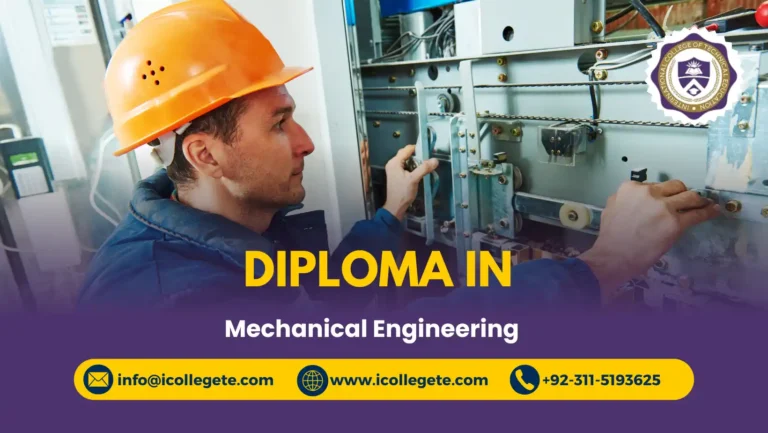In today’s world, security is a top priority for both businesses and homeowners. CCTV cameras play a crucial role in ensuring safety, preventing crimes, and providing real-time monitoring. As the demand for advanced security systems grows, the need for skilled CCTV camera technicians is on the rise. If you’re interested in this growing field, the Diploma in CCTV Camera Technician course offers the perfect opportunity to acquire the skills and knowledge required to thrive as a professional in the security industry.
The Diploma in CCTV Camera Technician course is designed to provide students with comprehensive training in the installation, maintenance, and troubleshooting of CCTV systems. This course covers the latest technologies, tools, and best practices used in the security industry, ensuring that students are equipped to handle a wide range of CCTV systems, from analog to modern IP-based cameras.
Throughout the course, you will gain hands-on experience with different types of CCTV cameras, understand how to configure them for optimal performance, and learn how to integrate CCTV systems with other security solutions. By the end of the course, you will be fully prepared to work as a professional CCTV camera technician.
Key Features of the Course:
- Hands-on Training: Gain practical experience with the installation and maintenance of CCTV systems.
- Comprehensive Curriculum: Learn about the different types of CCTV cameras, their components, and their applications.
- Industry-Ready Skills: Learn the necessary technical skills to work with both analog and IP CCTV systems.
Learning Outcomes
Upon successful completion of the Diploma in CCTV Camera Technician course, you will be able to:
- Install CCTV Systems: Understand the installation process for both analog and IP-based CCTV systems, including wiring, camera placement, and configuration.
- Troubleshoot CCTV Cameras: Diagnose and fix common issues related to CCTV cameras, including connectivity, image quality, and power supply problems.
- Work with DVRs and NVRs: Learn how to set up and operate Digital Video Recorders (DVRs) and Network Video Recorders (NVRs) for video storage and management.
- Understand Security Protocols: Gain knowledge of various security protocols and how CCTV integrates with other security systems like alarms and access control.
- Design CCTV Layouts: Plan and design efficient CCTV camera layouts for both residential and commercial properties.
- Maintain and Upgrade CCTV Systems: Learn the best practices for maintaining, upgrading, and servicing CCTV systems to ensure their longevity and effectiveness.
Study Units
The Diploma in CCTV Camera Technician course is structured into several key study units to ensure you develop a solid understanding of the concepts and practical skills involved in working with CCTV systems:
- Introduction to CCTV Technology:
- Overview of CCTV systems and their importance in security.
- Different types of CCTV cameras (analog, IP, HD, wireless).
- CCTV Components and Installation:
- Understanding cameras, lenses, cables, and connectors.
- Installation techniques for both wired and wireless CCTV systems.
- Configuring and Testing CCTV Systems:
- Configuring cameras for optimal performance.
- Testing and troubleshooting common issues.
- Digital and Network Video Recorders (DVRs/NVRs):
- Setting up and configuring DVRs and NVRs.
- Integrating DVRs/NVRs with CCTV cameras for video storage and retrieval.
- Video Surveillance Systems Design:
- Planning CCTV camera installations for various settings (homes, offices, industrial sites).
- Camera placement, coverage, and angle considerations.
- Maintenance and Troubleshooting:
- Regular maintenance practices to keep systems running smoothly.
- Diagnosing and solving technical issues with cameras, wiring, and recording devices.
- Security Integration and Networking:
- Integrating CCTV with other security systems (alarm systems, access control).
- Understanding networking protocols for IP-based CCTV cameras.
- Ethical and Legal Considerations:
- Understanding privacy laws and ethical considerations in video surveillance.
- Best practices for the lawful use and management of CCTV footage.
Course Benefits
Enrolling in the Diploma in CCTV Camera Technician course offers numerous advantages, including:
- In-Demand Skills: The security industry is rapidly growing, and CCTV technicians are in high demand. Completing this course will open up various job opportunities.
- Hands-on Learning: Gain practical, real-world experience working with the latest CCTV technologies and equipment.
- Career Advancement: A qualification in CCTV installation and maintenance can lead to higher-paying roles, career growth, and opportunities for specialization.
- Industry Recognition: The diploma is recognized by employers in the security industry, providing you with a competitive edge in the job market.
- Flexibility: The skills learned in this course are applicable across a wide range of industries, including residential, commercial, and industrial sectors.
Who Is This Course For?
The Diploma in CCTV Camera Technician course is suitable for individuals interested in pursuing a career in the security industry or enhancing their current skill set. The course is ideal for:
- Aspiring CCTV Technicians: If you want to start a career in CCTV installation and maintenance, this course will provide you with the foundational knowledge and skills.
- Security Professionals: If you’re already working in the security industry and want to specialize in CCTV systems, this diploma will help you advance your career.
- IT and Networking Professionals: If you have a background in IT or networking and want to expand your expertise into security systems, this course offers a great opportunity.
- Home and Business Security Enthusiasts: Individuals looking to learn how to install and manage their own CCTV systems will benefit from the practical knowledge gained in this course.
- Freelancers and Entrepreneurs: If you’re considering starting your own CCTV installation business, this diploma will equip you with the technical skills and industry insights needed to succeed.
The Diploma in CCTV Camera Technician course is the perfect pathway for anyone interested in building a career in the fast-growing security industry. With a solid curriculum that combines theoretical knowledge with hands-on training, this course prepares you to become a skilled professional in CCTV installation, maintenance, and troubleshooting.
Whether you are looking to become a qualified CCTV technician, advance your current career, or start your own security business, this course provides the necessary skills to succeed. Enroll today and take the first step toward a rewarding career in security systems technology!






